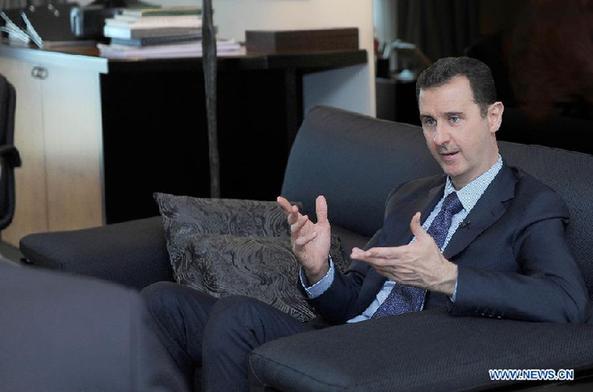Assad: Syria able to confront foreign aggression
 0 Comment(s)
0 Comment(s) Print
Print E-mail Xinhua, September 1, 2013
E-mail Xinhua, September 1, 2013
Syrian President Bashar al-Assad said Sunday that his country is capable of confronting any external aggression, in reference to a possible U.S.-led strike against his country, as Iran, his staunchest ally, pledged constant support to Damascus in face of escalating pressures.
 |
|
Syrian President Bashar al-Assad |
Assad made the remarks during his meeting with visiting Chairman of the Iranian Parliament National Security and Foreign Policy Commission, Alaeddin Boroujerdi, who arrived in Syria on Saturday.
"Syria is capable of confronting any foreign aggression as it confronts the daily attacks by the terrorist groups and those who stand behind them," Assad said.
The remarks came amid the U.S. threats to carry out a military operation against Syria, over the alleged use of chemical weapons by the government troops against the Syrian people in the countryside of Damascus last week.
While saying that Syria is achieving one victory after another until restoring security and stability to the homeland, Assad stressed that Washington's threats will not discourage Syria from commitment to its principles and firm stances, and from combating terrorism.
Meanwhile, Boroujerdi stressed Sunday his country's "support" to Syria due to its "stature in the axe of resistant," in reference to Iran, Syria and the Lebanese Hezbollah, which refer to themselves as the axe of resistant against the Western and Israeli hegemony.
Boroujerdi told reporters that his visit aims to emphasize his country's support to Syria and Tehran's rejection of any war or aggression against it.
He also warned that any war against Syria would have repercussions on the entire region.
"We think that the countries of this region must work on a political solution to the (Syrian) crisis," he said, adding that " unfortunately today the Islamic states and its people have been plagued with Takfiri (radical Sunni Muslims) movements and this would without a doubt serves the interest of the Zionist entity."
Moreover, he advised the Americans not to "play with fire and to walk instead on the path of the political solution because this choice would protect the political credibility of America and would also be recorded as a positive point for Obama."
"We think that the Syrian crisis could be surmounted through one choice only: the Syrian-Syrian political solution," he added.
Iran, one of the main regional allies of the Damascus government, rejected any foreign military intervention in Syria and warned of dire consequences of such an aggression.
On Saturday, U.S. President Barack Obama delivered a statement on what he believes should be the next course of action against Syria. He said the United States should strike Syrian government targets in response to a deadly chemical weapons attack on Aug. 21 near Damascus, but added that he will seek congressional authorization before taking military action.
Obama's remarks come after his top national security advisers gathered at the White House for talks, including Defense Secretary Chuck Hagel, Secretary of State John Kerry and Chairman of the Joint Chiefs of Staff Martin Dempsey. They will give senators an unclassified briefing on the Syria situation through conference calls.
The U.S. administration released an intelligence report concluding that Syrian President Bashar Assad's government killed more than 1,400 people last week in a chemical attack in the suburbs of Damascus.
On Sunday, Kerry promoted for Obama's approach and urged Congress to support Obama's push for military action in Syria.
"This case is building and this case will build," Kerry said during an interview with NBC's "Meet the Press," referring to the administration's claim that Syrian President Bashar al-Assad's regime used chemical weapons against its own people, a claim denied by Damascus.
The international community showed no appetite to join the United States with its possible war on Syria, except for France, whose leaders said they will go alongside the U.S. in their war. Yet, France said Sunday that it wouldn't get involved in a war on Syria alone, after Obama sought authorization from the Congress before taking military action.
France's Interior Minister Manuel Valls said Sunday that his country will not launch a military operation alone against Syria and will await the U.S. Congress's decision.
Obama's announcement had created "a new situation" which meant France would have to wait "for the end of this new phase," the minister added.
"We now have time and this time must be used to make things happen... Using chemical gas against population is a crime against humanity and the worst would be to do nothing," Valls stressed.
Syrian experts expressed astonishment over the U.S. stance and urged for awaiting the results of the investigation that was carried out in Syria over the weekend by the UN chemical weapons investigation team.
Martin Nesirky, UN Secretary-General Ban Ki-moon's spokesman, said Sunday that the work of the UN expert team fresh from investigating the alleged use of chemical weapons in Syria was " progressing well."
The team originally was granted permission to investigate allegations of chemical weapons use by the armed rebels in Syria at Syria's northern town of Khan al-Assal and two other sites, not named for security reasons. But, following reports that chemical weapons used in Ghouta on Aug. 21 had killed hundreds including women and children, UN Secretary-General Ban Ki-moon asked the head of the investigation team to prioritize investigating the Ghouta allegation.



 Add your comments...
Add your comments...

